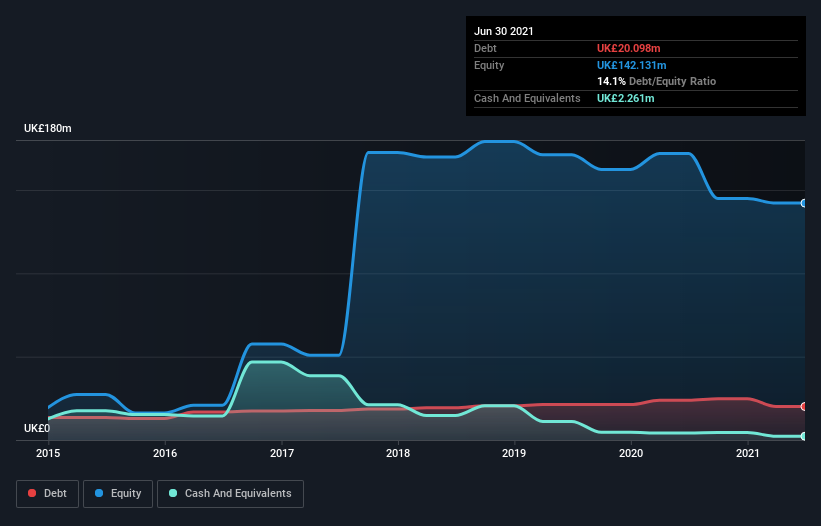Howard Marks put it nicely when he said that, rather than worrying about share price volatility, 'The possibility of permanent loss is the risk I worry about... and every practical investor I know worries about.' So it might be obvious that you need to consider debt, when you think about how risky any given stock is, because too much debt can sink a company. We note that Sound Energy plc (LON:SOU) does have debt on its balance sheet. But the real question is whether this debt is making the company risky.
When Is Debt Dangerous?
Debt assists a business until the business has trouble paying it off, either with new capital or with free cash flow. If things get really bad, the lenders can take control of the business. However, a more usual (but still expensive) situation is where a company must dilute shareholders at a cheap share price simply to get debt under control. By replacing dilution, though, debt can be an extremely good tool for businesses that need capital to invest in growth at high rates of return. The first step when considering a company's debt levels is to consider its cash and debt together.
See our latest analysis for Sound Energy
What Is Sound Energy's Debt?
You can click the graphic below for the historical numbers, but it shows that Sound Energy had UK£20.1m of debt in June 2021, down from UK£23.8m, one year before. On the flip side, it has UK£2.26m in cash leading to net debt of about UK£17.8m.

How Healthy Is Sound Energy's Balance Sheet?
According to the last reported balance sheet, Sound Energy had liabilities of UK£2.07m due within 12 months, and liabilities of UK£20.1m due beyond 12 months. On the other hand, it had cash of UK£2.26m and UK£1.59m worth of receivables due within a year. So its liabilities total UK£18.3m more than the combination of its cash and short-term receivables.
This deficit is considerable relative to its market capitalization of UK£23.6m, so it does suggest shareholders should keep an eye on Sound Energy's use of debt. This suggests shareholders would be heavily diluted if the company needed to shore up its balance sheet in a hurry. When analysing debt levels, the balance sheet is the obvious place to start. But it is Sound Energy's earnings that will influence how the balance sheet holds up in the future. So if you're keen to discover more about its earnings, it might be worth checking out this graph of its long term earnings trend.
Given its lack of meaningful operating revenue, Sound Energy shareholders no doubt hope it can fund itself until it can sell some combustibles.
Caveat Emptor
Over the last twelve months Sound Energy produced an earnings before interest and tax (EBIT) loss. Indeed, it lost a very considerable UK£15m at the EBIT level. Considering that alongside the liabilities mentioned above does not give us much confidence that company should be using so much debt. So we think its balance sheet is a little strained, though not beyond repair. Another cause for caution is that is bled UK£3.4m in negative free cash flow over the last twelve months. So in short it's a really risky stock. The balance sheet is clearly the area to focus on when you are analysing debt. However, not all investment risk resides within the balance sheet - far from it. These risks can be hard to spot. Every company has them, and we've spotted 6 warning signs for Sound Energy (of which 3 can't be ignored!) you should know about.
When all is said and done, sometimes its easier to focus on companies that don't even need debt. Readers can access a list of growth stocks with zero net debt 100% free, right now.
New: Manage All Your Stock Portfolios in One Place
We've created the ultimate portfolio companion for stock investors, and it's free.
• Connect an unlimited number of Portfolios and see your total in one currency
• Be alerted to new Warning Signs or Risks via email or mobile
• Track the Fair Value of your stocks
Have feedback on this article? Concerned about the content? Get in touch with us directly. Alternatively, email editorial-team (at) simplywallst.com.
This article by Simply Wall St is general in nature. We provide commentary based on historical data and analyst forecasts only using an unbiased methodology and our articles are not intended to be financial advice. It does not constitute a recommendation to buy or sell any stock, and does not take account of your objectives, or your financial situation. We aim to bring you long-term focused analysis driven by fundamental data. Note that our analysis may not factor in the latest price-sensitive company announcements or qualitative material. Simply Wall St has no position in any stocks mentioned.
About AIM:SOU
Sound Energy
Through its subsidiaries, engages in the exploration, appraisal, and development of gas assets in Morocco.
Medium-low risk and good value.
Similar Companies
Market Insights
Community Narratives



